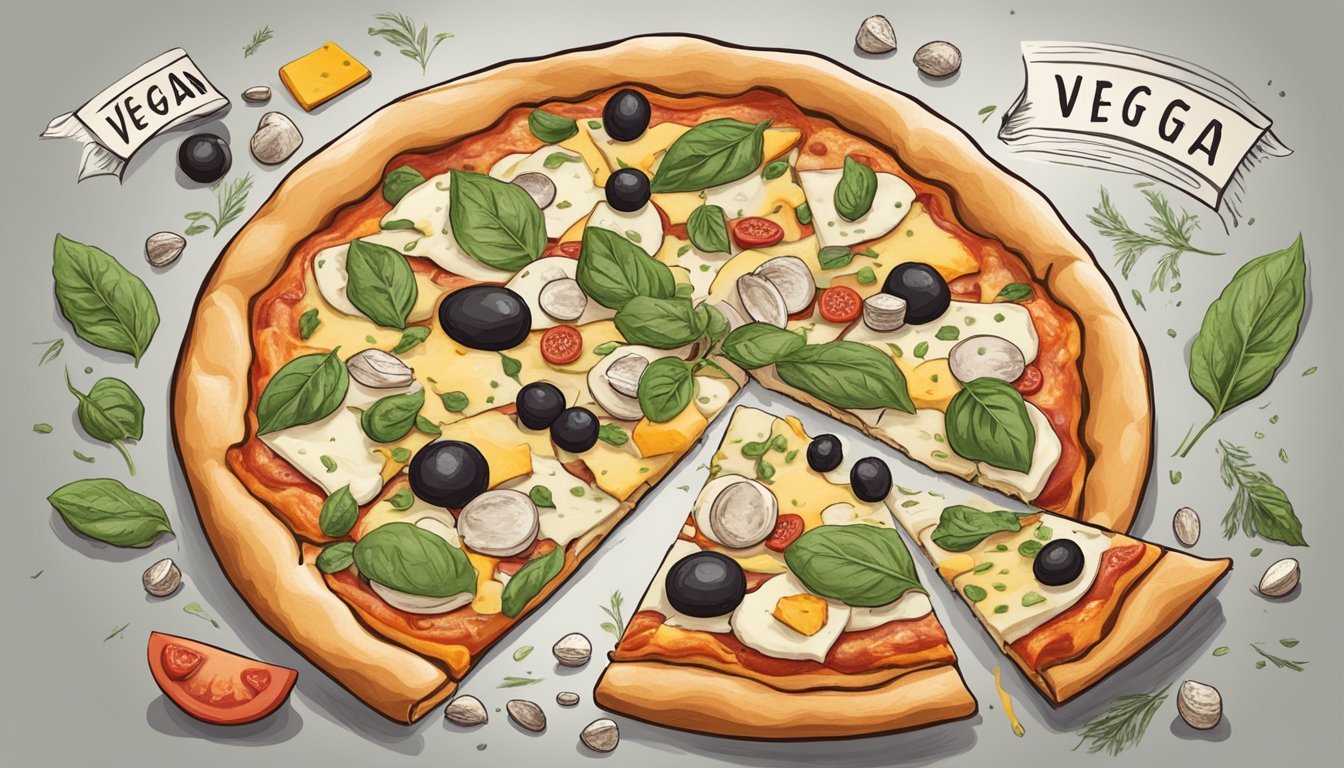Is Four Cheese Pizza Vegan?
Unveiling the Dairy Dilemma
Four cheese (What wine goes well with cheese?) pizzas (What wine goes well with pizza?) are a beloved variant of the classic Italian dish known for their rich and complex flavor profile, created by a blend of four different cheeses. Traditional four cheese pizzas are not vegan due to the inclusion of dairy cheeses such as mozzarella, parmesan, gorgonzola, and fontina, among others. These cheeses are sourced from animal milk and therefore, not suitable for those following a vegan lifestyle.
However, with the growing demand for plant-based options, the concept of vegan four cheese pizzas has emerged, catering to those who abstain from all animal products. Vegan four cheese pizzas substitute traditional dairy cheeses with plant-based alternatives made from a variety of ingredients like nuts, soy, and root vegetables. Vegans must be cautious when selecting a cheese pizza to ensure it meets their dietary requirements, as vegan cheeses vary widely in flavor, texture, and melting properties, factors essential to replicating the experience of their dairy counterparts. Moreover, the use of vegan cheeses contributes to a broader culinary exploration, offering an inclusive option that aligns with vegan values without compromising on the essence of a comforting four cheese pizza.
Understanding Veganism
In this section, readers will gain insight into the essentials of vegan diet principles and the specifics of vegan cheese, which is a crucial component for vegan versions of traditionally non-vegan dishes like four cheese pizza.
Vegan Basics
Veganism is a lifestyle choice centering around the exclusion of all animal products for ethical, environmental, or health reasons. A vegan diet is purely plant-based and excludes meat, dairy, eggs, and any other ingredients derived from animals. Individuals choosing a vegan lifestyle also avoid non-food products that exploit animals, such as leather and wool.
Key Characteristics of a Vegan Diet:
Plant-based: Includes fruits, vegetables, legumes, grains, nuts, and seeds.
Dairy-free: Eschews milk, cheese, yogurt, and butter made from animal milk.
Meatless: Omits all kinds of flesh including beef, poultry, fish, and shellfish.
No animal by-products: Avoids honey, gelatin, and other items derived from animal exploitation.
Vegan Cheese Essentials
Conventional four cheese pizza is not vegan as it contains cheese made from cow’s milk. This is where vegan cheese options come into play to replicate the experience without animal products. Vegan cheese is crafted to mimic the taste, texture, and melting properties of dairy-based cheese using various plant ingredients.
Common Bases for Vegan Cheese:
Nuts: Such as cashews and almonds, creating rich and creamy textures.
Soy: Often used for its protein content and versatility.
Coconut Oil: Provides a fatty, buttery consistency that aids in melting.
Starches: Such as tapioca, which helps achieve the desired stretchiness.
Nutritional Additions:
Nutritional Yeast: Adds a cheesy flavor and is fortified with B vitamins.
Seasonings: Include salt, garlic powder, and herbs to enhance flavor.
Vegan cheeses vary widely in flavor and texture, ranging from soft and spreadable to hard and sliceable. They can be found in health food stores or supermarkets with vegan-friendly sections. Dieters can choose from artisan brands or opt for mass-produced vegan products, depending on availability and personal preference. When making vegan pizza, it’s essential to select a cheese that melts well to ensure a palatable texture and cohesive flavor profile.
Components of Four Cheese Pizza
A four cheese pizza combines a quartet of distinct cheeses, each contributing its unique flavor and texture, along with a classic sauce and a foundation of well-crafted dough.
Traditional Cheese Varieties
Four cheese pizza typically features a blend of mozzarella, parmesan, cheddar, and sometimes feta or brie. - Mozzarella is prized for its melting properties and mild taste.
Parmesan adds a nutty and salty flavor punch.
Cheddar contributes to the depth with its sharpness.
Feta, when used, offers a tangy accent.
The Role of Sauce
The sauce acts as a flavor liaison between the dough and the cheeses. Often made from tomatoes, good tomato sauce is seasoned with herbs and sometimes a hint of sugar to complement the savoriness of the cheeses.
Dough Fundamentals
The dough is the pizza's canvas, made from flour, water, yeast, and salt. The yeast ferments the dough, adding airiness and structure, while a touch of sugar can promote browning and flavor development during baking.
Key Aspects of Vegan Cheese
Vegan cheese offers a plant-based alternative for traditional dairy cheese, utilizing various ingredients to replicate the taste and texture. Making successful vegan cheese involves understanding the components and how they interact in different recipes.
Ingredients in Vegan Cheese
A range of non-dairy ingredients is used to create vegan cheeses, each contributing to the final product's flavor, texture, and nutritional profile. Common ingredients include:
Nuts: Cashews are frequently utilized for their creamy texture after being soaked and blended.
Tapioca Starch: Provides the cheese with a stretchy, melted quality similar to that of real cheese.
Nutritional Yeast: Adds a cheesy, umami flavor without using any animal products.
Coconut Oil: Often used for rich texture and to help solidify the cheese.
Agar: A gelatinous substance derived from algae, used as a thickening agent.
Vegan Yogurt: Introduces bacteria cultures that can enhance tanginess, mimicking that of dairy cheese.
Miso Paste: Contributes a depth of flavor and is used in some recipes for its fermentation qualities.
Lactic Acid: Adds sharpness to the flavor, replicating the tang of dairy-based cheese.
Potatoes and Psyllium Husk: Can be used as bases or thickeners in certain vegan cheese recipes.
Vegan cheeses may also include additional flavors and nutrients to improve taste and health benefits, such as vegan parmesan for a sharper taste or vegan mozzarella for a milder, creamy profile.
Homemade Vegan Cheese Variations
Different methods and variations exist for making vegan cheeses at home, each with its own set of instructions:
Vegan Mozzarella: Often entails blending soaked cashews with nutritional yeast, tapioca starch, and a liquid such as water or plant-based milk, then heating until the mixture thickens.
Vegan Parmesan: Can be as simple as pulsing nuts, nutritional yeast, garlic powder, and salt in a food processor until fine.
Meltable cheeses: Incorporating ingredients like agar, psyllium husk, or tapioca starch helps achieve a melty texture appropriate for pizzas.
Cultured cheeses: Some recipes use vegan yogurt or rejuvelac to introduce live bacteria, giving the cheese a fermented, tangy characteristic.
Each variation of homemade vegan cheese is crafted to provide a unique sensory experience, designed to appeal to those looking for dairy-free cheese alternatives.
Preparing Vegan Four Cheese Pizza
Crafting a vegan four cheese pizza involves selecting the right combination of plant-based cheeses and creating a dough that bakes into the perfect crust. Precision in baking technique will ensure a golden, delicious pizza every time.
Vegan Cheese Selection
Vegan cheese options have expanded, but not all melt the same way dairy cheese does. For a diverse yet cohesive flavor, one may combine vegan mozzarella, cheddar, gouda, and parmesan alternatives. These should mimic the melting, stretching, and taste profiles of traditional pizza cheeses.
Suitable vegan cheese combinations might include:
Vegan mozzarella: for its melting and stretching qualities.
Vegan cheddar: for a sharp, tangy flavor.
Vegan gouda: for its creamy texture.
Vegan parmesan: to add a salty, umami kick.
One should consider the moisture content of the vegan cheeses, using them sparingly if they tend to get sticky when melted.
Crafting Vegan Pizza Dough
The base of any pizza is its dough, and for a vegan four cheese pizza, it needs to provide a firm foundation for the rich toppings.
Simple Vegan Pizza Dough Recipe:
In a bowl, combine 2 cups flour, 1 packet instant yeast, and 1/2 teaspoon salt.
Mix in 1 tablespoon olive oil and 3/4 cup warm water till a dough forms.
Knead until smooth, then cover with a kitchen towel and let it rise.
A well-kneaded pizza dough should be smooth and elastic. After rising, it can be rolled out into a thin base ready for the cheese.
Baking Techniques
Baking is critical; it can make or break a pizza.
Effective baking methods:
Preheat the oven with a pizza stone to 475°F (245°C). A pizza stone retains high heat, simulating a brick oven.
If a pizza stone isn't available, a preheated baking sheet can serve as an alternative.
Bake the pizza for 12-15 minutes or until the crust is golden brown and the vegan cheeses have melted properly.
The combination of high temperature and consistent heat is necessary for achieving a crisp crust and evenly melted cheese. Fresh basil leaves, a drizzle of olive oil, and a sprinkle of salt can finish the pizza once out of the oven.
Flavor Enhancements and Toppings
Crafting a delicious vegan four cheese pizza requires thoughtfully selected herbs, spices, and toppings that complement the dairy-free cheese alternatives. Vegan cheese can be paired with a range of flavors to create a complex, satisfying taste profile.
Herbs and Spices
To infuse a pizza with aromatic depth, dried herbs such as oregano, basil, and thyme are essential. These herbs release their flavors over time, making them ideal for baking. Garlic powder offers the pungent essence of garlic without the need to roast or mince fresh cloves and is easy to distribute evenly across the pizza. Use a conservative hand with onion powder and black pepper to enhance the cheese's inherent flavors without overwhelming them. A table showcasing the impact of each herb and spice on the vegan cheese profile is as follows:
Herb/Spice Flavor Contribution Best When Added Dried Oregano Earthy, slightly bitter Before baking Basil Sweet, peppery Before or after baking Garlic Powder Pungent, slightly sweet Mixed with sauce or sprinkled on top before baking Onion Powder Savory, a hint of sharpness Mixed with sauce or sprinkled on top before baking Black Pepper Spicy, earth with lemony undertones Before or after baking
Additional Toppings and Garnishes
Apart from the foundational herbs and spices, toppings bring texture and variety to a vegan four cheese pizza. Nutrient-rich spinach or arugula adds a fresh, peppery touch when sprinkled on top after baking. Mushrooms sautéed with minced fresh garlic offer a meaty, savory complement to the melty cheese. Grape tomatoes, olives, and jalapeños introduce sweetness, brininess, and heat, respectively:
Spinach/Arugula: Add post-baking for a fresh, slightly wilted effect.
Mushrooms with Garlic: Sauté and add before baking for an infused flavor.
Grape Tomatoes: Slice and add before baking for a burst of juiciness.
Olives: Pit and slice, then add before baking for a hint of saltiness.
Jalapeños: Slice and deseed for less heat, add before baking for a spicy kick.
Each additional ingredient should be used to balance the flavor profile of the cheese and not overpower it, ensuring every bite is harmoniously delicious.
Nutritional Profile of Vegan Pizza
In considering the nutritional profile of vegan pizza, especially varieties like four cheese pizza, one must evaluate the protein and fiber content, as well as the caloric considerations. These elements greatly influence the nutritional value of the pizza.
Protein and Fiber Content
Vegan pizzas often derive protein from plant-based cheeses and toppings like vegetables or meat substitutes. For instance, a slice of vegan pizza can typically contain between 9 and 10 grams of protein, depending on the types of vegan cheese and additional toppings used. Fiber content largely comes from the crust, particularly if made from whole grains, and the vegetables topping the pizza.
Example Protein Content by Ingredient (per slice):
Vegan cheese: 1-3 grams
Meat substitutes: 2-5 grams
Vegetable toppings: 1-2 grams
Example Fiber Content by Source (per slice):
Whole grain crust: 2-4 grams
Vegetables: 1-3 grams
Caloric Considerations
Vegan pizza can vary in its caloric content based on the ingredients used. A slice of whole foods vegan cheese pizza, for instance, contains approximately 490 calories. The type of crust, the variety and amount of vegan cheese, and additional toppings all contribute to the total caloric count.
Caloric Breakdown (approximate per slice):
Base and sauce: 200-300 calories
Vegan cheeses: 100-200 calories
Toppings: 50-100 calories
When choosing ingredients for a vegan four cheese pizza, one should consider using moderation with vegan cheeses, as some can be calorie-dense due to their fat content.
Special Dietary Concerns
When it comes to special dietary concerns for a four-cheese pizza, two primary considerations are whether the pizza can be made gluten-free and what allergen information should be noted, particularly for those with sensitivity to nuts or specific plant milks.
Gluten-Free Options
For individuals requiring gluten-free diets, a four-cheese pizza can be adapted using gluten-free crusts commonly made from flours like tapioca or rice flour. Many establishments now cater to gluten sensitivities and may offer a specifically designed gluten-free menu. When choosing a gluten-free pizza, it is essential for one to confirm that the pizza has been prepared in a gluten-free environment to avoid cross-contamination.
Allergen Information
A vegan four-cheese pizza might contain various allergens, including nuts, as nut-based cheeses are a popular dairy-free alternative. Plant milk, often used in vegan cheese making, can be derived from almonds, cashews, or soy, all of which are recognized allergens. Thoroughly assessing the cheese substitutes' ingredients is critical for those with allergen concerns. Below is a list highlighting common allergens that might be present:
Nuts: Almonds, cashews (used in some plant-based cheeses)
Plant Milk: Soy milk, almond milk (used in cheese alternatives)
Additional Allergens: Soy (in some vegan cheeses), yeast (used in some pizza bases)
Patrons should always notify the staff of their allergen concerns and ask for detailed ingredient lists to ensure that the four-cheese pizza meets their specific dietary requirements.
Creative Vegan Pizza Variations
In the realm of plant-based pizza, the options for cheese and toppings are vast, offering an array of flavors that cater to vegan diets without compromising on taste.
Exploring Different Vegan Cheeses
Homemade Vegan Mozzarella Cheese: A popular choice for achieving that desirable 'melty' quality on pizza is homemade vegan mozzarella. Typically, a vegan mozzarella cheese recipe might include a base of cashews or pine nuts, blended with water and nutritional yeast to give the cheesy flavor. For those seeking a quicker solution, commercial brands like Daiya offer shredded mozzarella alternatives that are plant-based and ready to sprinkle atop any pizza creation.
Cashew Cheese and Other Nut-Based Cheeses: Beyond mozzarella-style, cashew cheese is revered for its creamy texture and versatility. It’s made by blending soaked cashews with seasonings like garlic and lemon juice. Nut-based cheeses can include other ingredients like tofu to add protein and alter the consistency, catering to various preferences and dietary needs.
Innovative Vegan Toppings
Plant-based pizzas thrive on imagination, and the right combination of toppings can elevate them to new heights. Here's a selection of vegan toppings grouped by category:
Vegetables:
Bell peppers
Red onions
Mushrooms
Artichokes
Kale
Spinach
Proteins:
Unconventional:
Hummus
Grilled vegetables
Vegan pesto
In conjunction with varied vegan pizza dough recipes that might include whole wheat, gluten-free, or even quinoa-based crusts, these toppings ensure that every homemade vegan pizza is as nutritious as it is delectable.









